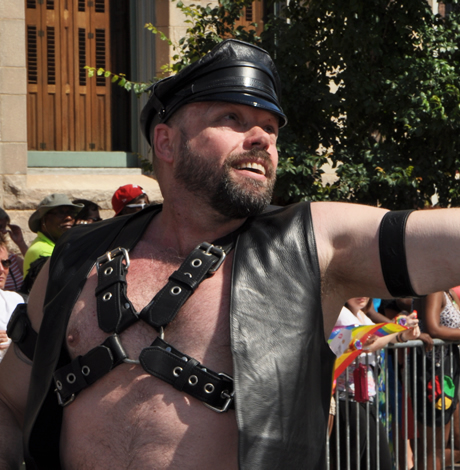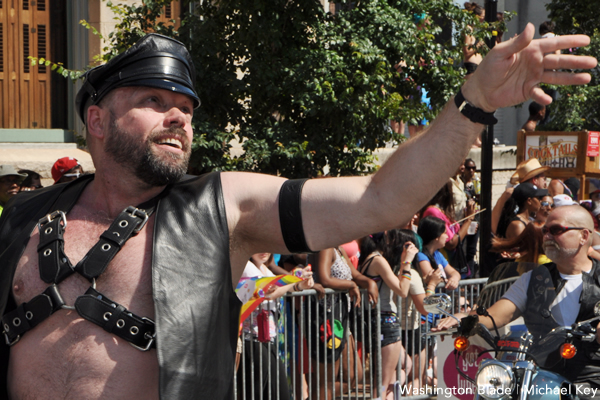Local
Obstacles remain in Baltimore Eagle reopening
Renovations could top $1 million


The Baltimore Eagle closed in 2012. (Washington Blade file photo by Michael Key)
The Baltimore Eagle, a mainstay of Baltimore’s leather community since 1991, closed in December 2012 following its sale, leaving many in the community uncertain as to the bar’s fate.
Charles Parrish and Ian Parrish purchased the property and vowed to re-open it again as the Baltimore Eagle after renovations are completed. But when Ian Parrish came in to further examine the premises located at 2022 N. Charles St. following the sale, the magnitude of the work needed to complete the project was, as he put it, “the worst possible case.”
According to the website of the Community Law Center, a nonprofit law firm that provides legal services to community and nonprofit organizations throughout Maryland, “There was a lien on the property that the title search did not pick up. The property was full of garbage and had been used for drugs and prostitution. The roof was collapsing and the mortar between the bricks was turning to sand. The Parrishes had to gut the building. So far, he [sic] has expended $150,000 and the project will probably end up costing around $1 million.” This does not include the purchase price.
Parrish indicated that a dumpster a day for a month was needed to remove the trash, two large box trucks of furniture and personal items were donated to Habitat for Humanity, and even more truckloads of items were sent for recycling. Other work, such as the installation of an electrical line from BGE and a six-month permitting process, were essential to bring the building up to code.
“We took bed sheets off the wall covering structural problems. . . there were goods and memorabilia collected over 30 years. It was 10,000 square feet of hoarder space,” Parrish said. As a result of these unexpected delays, the 180-day requirement needed to complete construction was not met to satisfy the Baltimore Liquor Board, thus placing the entire project in jeopardy.
Throughout this period, the Parrish family stated that they kept neighboring civic associations, city officials and others abreast of the ongoing developments. During a contentious hearing with the liquor board on March 12, the Parrishes along with their attorney Melvin Kodenski argued that their application for a transfer of ownership be approved since the scope of the reconstruction warranted an extension of the 180-day guideline.
Kodenski noted that in the past, such extensions were granted for cases of fire, arson, redevelopment and other issues. He cited a case, Woodfield v. West River Improvement Association, which he said held that the board does not have to enforce the 180-day provision, if it chooses not to.
One of the three-member Liquor Board commissioners, Dana Petersen Moore, strongly rebuked Kodenski’s argument saying, “all of that went out the window after the audit. Those policies and procedures were wrong.” Indeed, the audit she referred to criticized previous commissioners for disregarding Maryland law and new commissioners were appointed—two by then-Gov. Martin O’Malley and one by Mayor Stephanie Rawlings-Blake—to enforce the rules more stringently.
Tom Ward, a former judge who was appointed to chair the board, told Kodenski to submit a legal memorandum delineating the circumstances for why the board should extend the timeframe. Ward remarked during the hearing, “It looks to me like maybe you bought something that you shouldn’t have bought.”
Kodenski would have to find legal precedent but would need to go outside of Baltimore City since the past liquor board’s actions have been criticized based on the audit. Ward stated that if he cannot be convinced to extend the 180-day rule after reviewing Kodenski’s memorandum, the liquor license would be considered dead.
Much of the arguments at the March 12 hearing focused on turf battles among various civic associations and over process and not knowing the plans for the establishment. Representatives from the Charles North Community Association and the Charles Village Civic Association opposed the extension. Kelly Cross, president of the Old Goucher Community Association, was in support of the project stating that the neighborhood is in need of nightlife entertainment.
Ian Parrish remains optimistic that these issues will be resolved and will soon unveil his new management team. “They said I shouldn’t have bought that building, but I think this neighborhood and this bar are worth the risk,” Parrish told the Blade. “The groundwork is laid, our construction team is standing by, and as soon as the eight people who oppose this project get out of the way, we can get to work.”
The Baltimore Eagle’s website still points to a 2015 re-opening.
Maryland
Md. Commission on LGBTQIA+ Affairs released updated student recommendations
LGBTQ students report higher rates of bullying, suicide

The Maryland Commission on LGBTQIA+ Affairs has released updated recommendations on how the state’s schools can support LGBTQ students.
The updated 16-page document outlines eight “actionable recommendations” for Maryland schools, supplemented with data and links to additional resources. The recommendations are:
- Developing and passing a uniform statewide and comprehensive policy aimed at protecting “transgender, nonbinary, and gender expansive students” against discrimination. The recommendation lists minimum requirements for the policy to address: name, pronoun usage, and restroom access.
- Requiring all educators to receive training about the specific needs of LGBTQ students, by trained facilitators. The training’s “core competencies” include instruction on terminology, data, and support for students.
- Implementing LGBTQ-inclusive curricula and preventing book bans. The report highlights a “comprehensive sexual education curriculum” as specifically important in the overall education curriculum. It also states the curriculum will “provide all students with life-saving information about how to protect themselves and others in sexual and romantic situations.”
- Establishing Gender Sexuality Alliances “at all schools and in all grade levels.” This recommendation includes measures on how to adequately establish effective GSAs, such as campaign advertising, and official state resources that outline how to establish and maintain a GSA.
- Providing resources to students’ family members and supporters. This recommendation proposes partnering with local education agencies to provide “culturally responsive, LGBTQIA+ affirming family engagement initiatives.”
- Collecting statewide data on LGBTQ youth. The data on Maryland’s LGBTQ youth population is sparse and non-exhaustive, and this recommendation seeks to collect information to inform policy and programming across the state for LGBTQ youth.
- Hiring a full-time team at the Maryland Department of Education that focuses on LGBTQ student achievement. These employees would have specific duties that include “advising on local and state, and federal policy” as well as developing the LGBTQ curriculum, and organizing the data and family resources.
- Promoting and ensuring awareness of the 2024 guidelines to support LGBTQ students.
The commission has 21 members, with elections every year, and open volunteer positions. It was created in 2021 and amended in 2023 to add more members.
The Governor’s Office of Communication says the commission’s goal is “to serve LGBTQIA+ Marylanders by galvanizing community voices, researching and addressing challenges, and advocating for policies to advance equity and inclusion.”
The commission is tasked with coming up with yearly recommendations. This year’s aim “to ensure that every child can learn in a safe, inclusive, and supportive environment.”
The Human Rights Campaign’s most recent report on LGBTQ youth revealed that 46.1 percent of LGBTQ youth felt unsafe in some school settings. Those numbers are higher for transgender students, with 54.9 percent of them saying they feel unsafe in school.
Maryland’s High School Youth Risk Behavior Survey reveals a disparity in mental health issues and concerns among students who identify as LGBTQ, compared to those who are heterosexual. LGBTQ students report higher rates of bullying, feelings of hopelessness, and suicidal thoughts. Nearly 36 percent of LGBTQ students report they have a suicide plan, and 26.7 percent of respondents say they have attempted to die by suicide.
The commission’s recommendations seek to combat the mental health crisis among the state’s LGBTQ students. They are also a call for local and state governments to work towards implementing them.
Virginia
Va. lawmakers consider partial restoration of Ryan White funds
State Department of Health in 2025 cut $20 million from Part B program

The Virginia General Assembly is considering the partial restoration of HIV funding that the state’s Department of Health cut last year.
The Department of Health in 2025 cut $20 million — or 67 percent of total funding — from the Ryan White Part B program.
The funding cuts started with the Trump-Vance administration passing budget cuts to federal HIV screening and protection programs. Rebate issues between the Virginia Department of Health and the company that provides HIV medications began.
Advocates say the funding cuts have disproportionately impacted lower-income people.
The Ryan White HIV/AIDS Program, a federal program started in 1990, provides medical services, public education, and essential services. Part B offers 21 services, seven of which remained funded after the budget cuts.
Equality Virginia notes “in 2025, a 67 percent reduction severely destabilized HIV services across the commonwealth.”
Virginia lawmakers have approved two bills — House Bill 30 and Senate Bill 30 — that would partially restore the funding. The Ryan White cuts remain a concern among community members.
Both chambers of the General Assembly must review their proposed changes before lawmakers can adopt the bills.
“While these amendments aren’t a full restoration of what community-based organizations lost, this marks a critical step toward stabilizing care for thousands of Virginians living with HIV,” said Equality Virginia Executive Director Narissa Rahaman. “Equality Virginia plans to continue their contact with lawmakers and delegates through the conference and up until the passing of the budget.”
“We appreciate lawmakers from both sides of the aisle who recognized the urgency of this moment and will work to ensure funding remains in the final version signed by the governor,” added Rahaman.
District of Columbia
D.C. Black Pride theme, performers announced at ‘Speakeasy’
Durand Bernarr to headline 2026 programming

The Center for Black Equity held its 2026 DC Black Pride Theme Reveal event at Union Stage on Monday. The evening, a “Speakeasy Happy Hour,” was hosted by Anthony Oakes and featured performances by Lolita Leopard and Keith Angelo. The Center for Black Equity organizes DC Black Pride.
Kenya Hutton, Center for Black Equity president and CEO, spoke following the performances by Leopard and Angelo. Hutton announced this year’s theme for DC Black Pride: “New Black Renaissance.”
Performers for 2026 DC Black Pride were announced to be Bang Garcon, Be Steadwell, Jay Columbus, Bennu Byrd, Rue Pratt and Akeem Woods.
Singer-songwriter Durand Bernarr was announced as the headliner for the 2026 festivities. Bernerr gave brief remarks through a video played on the screen at the stage.
DC Black Pride is scheduled for May 22-25. For more information on DC Black Pride, visit dcblackpride.org.



















